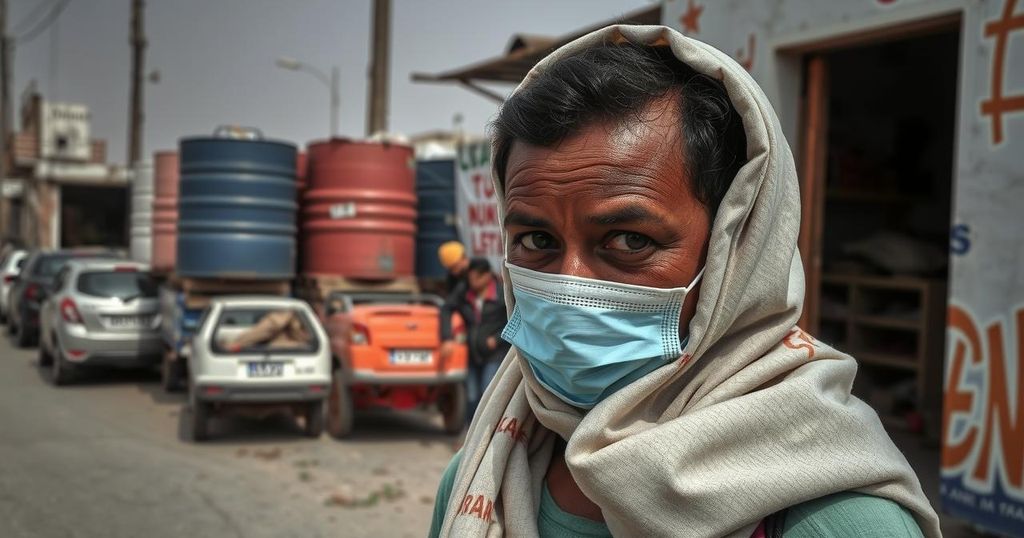The conflict in Lebanon, ignited by a Hamas-led attack on Israel, has resulted in 177,000 migrant workers, predominantly from Africa and Asia, being abandoned by their employers. This has left them vulnerable and exposed to violence and exploitation. Community organizations are stepping in to provide assistance, yet the scale of the crisis presents significant challenges.
The continuing violence in Lebanon, triggered by a Hamas-led assault against Israel, has led to severe consequences for many individuals, with 177,000 migrant workers significantly affected. Primarily consisting of women from Africa and Asia, these workers are now left vulnerable after their employers hastily abandoned them in the midst of ongoing military actions. One poignant example is Lina, a 29-year-old Kenyan housekeeper, who found herself alone in her Beirut apartment following the departure of her employers amidst escalating conflict.
Lina’s experience reflects the escalating fears faced by countless migrant workers now navigating precarious living conditions devoid of support. As local citizens seek safety, the already precarious status of low-paid migrant workers has come to the forefront, particularly under the exploitative kafala system, which binds their legal rights to their employers. Consequently, many workers find themselves trapped in abusive environments with few opportunities for alternative employment.
Moreover, the influx of displaced individuals has overwhelmed overcrowded shelters, forcing many migrant workers to sleep on the streets where they face threats of violence and exploitation. Reports indicate widespread discrimination and dire living conditions, disproportionately endangering women. Alleviating these hardships, community organizations like Egna Legna are mobilizing to deliver critical support to affected individuals. Founder Banchi Yimer noted that her team has already documented over a thousand abandoned workers within a mere few days, highlighting the pressing need for immediate assistance.
However, the vast scope of the crisis presents considerable challenges. Although several embassies, including those from Ethiopia, Sri Lanka, and the Philippines, have made attempts to shelter their nationals, many migrant workers remain stranded. The cost of evacuation flights has dramatically increased, more than doubling the usual fees, thus creating a significant financial hurdle for those in need of departure. Despite the Kenyan government issuing advisories against travel to Lebanon due to the absence of formal labor agreements, the dire reality for current migrant workers remains unchanged, as articulately expressed by Vionnah Kerubo, another Kenyan domestic worker, stuck in a threatening environment due to her employer’s refusal to allow her release.
The overarching fear exacerbated by relentless bombings has left numerous workers, like Vionnah, in a state of desperation. This crisis bears similarities to the experiences of migrant workers during the COVID-19 pandemic when many faced abandonment from employers who could no longer meet their financial responsibilities. The inadequate response from consulates has compounded the suffering experienced by migrant workers, compelling them to depend on their own networks for assistance and solace during these tragic times.
The Lebanon crisis has its roots in the recent violent escalation following a Hamas attack on Israel. The ensuing conflict has not only led to significant loss of life but also prompted a mass exodus of local citizens, leaving behind numerous migrant workers, primarily women from African and Asian nations. The situation is further complicated by the exploitative kafala system, undermining these workers’ legal rights and entraping them in potentially dangerous environments, thus emphasizing the precarious nature of their existence in Lebanon. As organizations and embassies struggle to provide support amid the crisis, the plight of these individuals remains dire, showcasing a complex intersection of political unrest, labor exploitation, and humanitarian need.
The ongoing crisis in Lebanon highlights the vulnerable position of migrant workers caught in violent conflicts, disproportionately affecting women from Africa and Asia. As employers flee, leaving their workers behind, the challenge of navigating unsafe living conditions amid systemic exploitation becomes paramount. While community organizations strive to provide assistance, the overwhelming scale of the crisis demands a more robust response from governments and international entities. Ultimately, without immediate and effective intervention, many of these workers may continue to suffer severe hardships in silence, echoing the grim experiences of previous crises.
Original Source: www.mwakilishi.com






